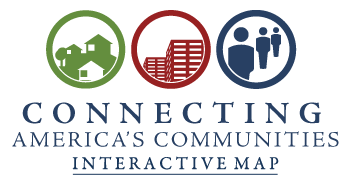BTOP in Action
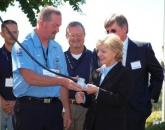
North Carolina Gov. Bev Perdue left an MCNC-sponsored groundbreaking on October 8, 2010, with a unique keepsake: a plaque featuring the first optical fiber cable manufactured to support the state’s BTOP projects.
Manufactured at a North Carolina plant, the cable symbolized both the broadband improvements to come from the project and its economic benefits. MCNC estimates that the project will create more than 1,000 temporary engineering and construction jobs as well as approximately 10 permanent jobs to manage the fiber infrastructure expansion.
Construction began November 2010 on five priority routes, the first steps towards expanding the existing North Carolina Research and Education Network (NCREN). By the first of the year, MCNC expects to light 200 miles of existing cable between Raleigh and Wilmington. MCNC estimates that it will improve broadband access for 100 or more community anchor institutions.
The project will also deliver unique benefits to the National Climatic Data Center (NCDC) in Asheville, the world's largest active archive of weather data from national and international meteorological services. NCDC has historically paid premium rates to send massive data files to researchers who do weather modeling, but says the NCREN expansion will make these transmissions possible at a fraction of the cost.
To see local news coverage, please visit here.
Last Updated: January 5, 2011
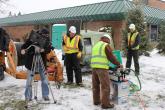
On December 21, 2010, Merit Network broke ground on 2,287 miles of open-access, advanced fiber-optic network through rural and underserved communities in Michigan's Lower and Upper Peninsulas. Undeterred by snow, representatives from the offices of U.S. Senators Carl Levin and Debbie Stabenow, Connect Manistee, the Manistee Intermediate School District, and the Manistee Alliance for Economic Success joined Merit Network staff in a ceremony commemorating the first phase of construction. The event was held at the Manistee Intermediate School District headquarters, the first community anchor institution connected by the REACH-3MC project.
The $130 million REACH-3MC project, $103 million of which is funded by BTOP, intends to connect 105 community anchor institutions and spur deployment of affordable broadband to households and businesses that lack adequate service options in 52 counties. Michigan Governor Jennifer M. Granholm cited the benefits of the project saying, “The Merit Network project funded by the Recovery Act will give schools, local governments, libraries, healthcare providers and other important anchor institutions in Michigan access to high-quality, high-speed Internet service and provide expanded opportunities for economic development throughout the state."
Over the course of the project, Merit Network will also use BTOP funds to create new jobs. Currently, Merit has hired six new employees to assist with the construction and is holding community meetings and quarterly webcasts to update local citizens on the project’s progress. To see local news coverage, please visit here.
Last Updated: October 17, 2011
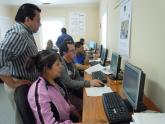
Digital illiteracy is a barrier to community participation and family progress for many adults across the country. The Mexican Institute of Greater Houston (MIGH) addresses this digital divide and also focuses on populations with an added barrier: English is their second language. MIGH’s goal is to engage these populations, as well as improve broadband adoption rates in the Greater Houston, Beaumont, Dallas, and San Antonio areas through broadband outreach and training for Hispanic and minority communities. The project is utilizing its network of over 100 existing community centers, many located at K-12 public schools in the region, to conduct basic computer technology training sessions in Spanish for students and their families, as well as expanding the network to accommodate the program’s growth and development.
MIGH programs enrich the lives of Hispanic adults through education. Classes at Keeble Early Childhood/Pre-K Center began in February 2011. Students at the center are primarily young moms who want to learn how to use computers. The skills learned in the class help the mothers participate more actively in their children’s education and develop their own lives. Any MIGH student can also go to the Mendenhall computer laboratory for courses in basic computer skills, such as how to use word processing software, navigate the Internet, and open an e-mail account. Additionally, MIGH’s computer center open labs allow visitors to gain additional computer practice and knowledge.
Since September 2010, MIGH has hired three new staff members, three new instructors, and six new tutors as a result of BTOP. Instructors and tutors typically are selected from MIGH program graduates and receive additional instruction through program instructor/tutor classes. These individuals have the additional opportunity to apply their newly acquired skills to teaching others. One former student is a teacher by trade but her disability made it difficult for her to find a job. She has enthusiastically enrolled to receive training to become a MIGH on-line tutor. These are just a few of the many success stories from MIGH’s training classes, where students are gaining marketable workforce skills.
Last Updated: October 17, 2011.
Michigan State University (MSU) celebrated the opening of a new BTOP-funded public computer center (PCC) on August 12, 2010, at Lake Superior Village Youth Center in Marquette, an underserved area with high unemployment. Community leaders, youth center staff, and government officials, including a representative from Congressman Bart Stupak’s office, attended the event. The new center includes a media lab with 16 workstations and provides computer access to low-income elementary and high school students participating in the center’s summer and after-school programs. MSU expected to complete three more PCCs by fall 2010. The project expects to add 500 new workstations at PCCs throughout the state, serving nearly 13,000 additional users per week. Major state government programs including the Michigan Economic Development Corporation, and Michigan Works! Association are involved in the project for job retraining, and local and county government programs to expand training and business support services.
Last Updated: November 22, 2010
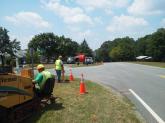
In March 2011, the Mid-Atlantic Broadband Cooperative (MBC) began construction on 422 miles of new fiber-optic infrastructure. MBC’s project, Middle Mile Expansion for Southern Virginia, is expanding an existing 800-mile network to connect approximately 120 K-12 schools, many in isolated areas.
MBC’s Southern Virginia project, encompassing 16 counties, is proceeding rapidly. At the end of August 2011, the project was already halfway done, with 212 miles of new fiber laid, along with two of four interconnection points completed. Additionally, in August, the school districts of Franklin County and Cumberland County opened their doors to K-12 students with classrooms equipped, for the first time, with high-speed Internet access. This new network is helping these schools enhance their educational curriculums to better meet the needs of today’s students. Cumberland County schools, for example, have gone from 45 Mbps to 100 Mbps, which allows video streaming without buffering, enhances online collaboration, and lays the foundation for virtual classrooms.
BTOP funds have allowed MBC to engage five contracting firms, which have hired 98 workers for construction crews. In addition, MBC has hired six people for various headquarters positions.
Last Updated: February 1, 2012
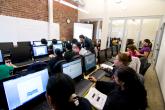
Mission Economic Development Agency (MEDA)
To improve economic and social conditions in communities across the country, Mission Economic Development Agency (MEDA) opened 18 public computer centers in 13 communities with a focus on helping entrepreneurs establish and grow small businesses. These centers provide free access to broadband, digital literacy classes, and technology workshops that help local residents take their ideas and expand them into productive, profitable entities.
BTOP funds have allowed the project to deploy approximately 350 new workstations that are used by participants in MEDA’s business development program. To people interested in owning or expanding a small business, the program offers workshops or one-on-one consultations on a variety of topics including capital assessment, business planning, budgeting, and marketing. Individuals who participate in this program are encouraged to take digital literacy classes to learn the computer skills needed to run a business most effectively.
MEDA’s computer centers also offer resources to help community members develop the skills needed to find and retain a job. Community members can participate in digital literacy classes, such as computer basics, Internet fundamentals, financial education, and online banking. Individuals can also receive assistance with resume creation, job searches, and interview preparation.
MEDA’s new computer centers are already helping new business owners to succeed. In Idaho, a local resident enrolled in MEDA’s business development program to learn how to grow her small film business. Through business marketing classes and tutoring sessions on Wix® Website Builder software, she was able to create a website and acquire a contract from a local band promoter to film music bands. In Los Angeles, an owner of a local party supplies company expanded the marketing reach of his company after taking digital literacy and advertising classes.
Last updated: April 17, 2012
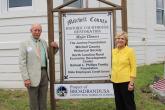
The Mitchell County Historic Courthouse Foundation celebrated the dedication of the new county courthouse and its BTOP-funded public computer center (PCC) on May 2, 2010. More than 150 people, including two state legislators and a representative from the North Carolina governor’s office, viewed multi-media presentations using equipment from the PCC’s distance learning videoconferencing center. The PCC is one part of an overall effort to restore the original Mitchell County Courthouse in Bakersville, N.C. The other purpose of the Foundation is to improve the economic and quality of life conditions for the people of Mitchell County by converting the Historic Courthouse into a fully functional center for educational, cultural, and economic activity. The availability of computers will contribute to developing the knowledge, skills, attitudes, and attributes of a productive workforce.
Last Updated: October 17, 2011
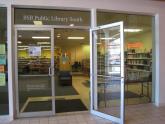
Montana State Library opened two new public computer centers at libraries in the cities of Butte and Billings. These centers support a statewide effort to provide affordable broadband, computer skills, and workforce development training to senior citizens, job seekers, and young adults. Each library provides new computers and digital literacy classes that are tailored specifically to the needs of its patrons.
In December 2010, damage from a fire caused the Butte-Silver Bow Public Library to close and open a temporary site in the Butte Plaza Mall. Along with traditional library services, visitors to the site can access broadband Internet on new laptops and workstations. Patrons also can attend a variety of digital literacy classes supported by BTOP funds, including computer basics, Internet fundamentals, and email techniques.
The temporary site, deemed the Library’s “South Branch,” was able to provide library services to its community members while the main branch underwent renovations. As of June 2011, more than 579 community members participated in the South Branch’s 53 digital literacy workshops and approximately 2,000 users each month utilize the new workstations. Additionally, a survey of visitors revealed a desire to make the facility permanent even after the main Butte-Silver library became fully operational. The Butte-Silver Library has been able to meet the needs of its community and keep computer centers at both libraries fully operational. The main library houses 10 new workstations and offers digital literacy trainings.
The Montana State University Billings College of Technology’s computer center offers 20 new laptops that patrons can use to search for jobs, learn computer basics, and work on school-related assignments. Visitors also can participate in digital literacy classes that cover topics such as computer basics and Microsoft Windows® software fundamentals. This community library is a joint academic-public library project between Montana State University and Parmly Billings Library.
The Montana State Library is working to provide more access to broadband Internet at faster speeds to 42 local libraries in 29 counties across the state within reach of 86 percent of Montana’s population. To sustain broadband adoption across the state, the project is deploying approximately 195 new computers and upgrading another 149 in 42 local libraries across 29 counties. As of June 2011, 328 new and refurbished computers have been distributed, serving more than 16,220 users per week. Participating libraries also partner with local organizations to create targeted marketing campaigns that will reach local constituents. For example, the Butte-Silver Bow Library partnered with AARP to promote its computer skills classes and increase participation among senior residents.
Last Updated: October 17, 2011

The Central Coast Broadband Consortium Public Computing Alliance, led by the Monterey County Office of Education, is working to open three new public computer centers, improve 26 existing centers, and offer free training to residents of California’s Salinas River Valley region. The Alliance, made up of education organizations, libraries, and other community organizations, hopes that improved broadband access will help address the needs of an area where over half of the population speaks a language other than English at home, and high school graduation rates are low.
On May 4, 2011, Salinas Mayor Dennis Donohue joined the Alliance to celebrate the reopening of the Chinatown Community Learning Center. The Center’s 16 lab stations are used to provide free training classes to the community. Classes include an introduction to the digital world as well as classes for Spanish speakers and job seekers. The Center also offers classes for the local homeless population. Students say the Center feels like a community and that classes are creating opportunities for them, helping them to advance and rejoin the workforce.
The Alliance’s primary public computer center is located at the Media Center for Art, Education and Technology (MCAET) in Salinas. In addition, MCAET is launching a mobile digital classroom by September 2011. The semi-tractor trailer truck will travel throughout the Salinas Valley to provide digital media and computer classes to students of all ages. Additional public computer centers and community partners offer training including basic computer and Internet skills, word processing, animation, web design, digital photography, and audio and video production.
Last Updated: October 17, 2011.
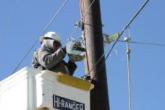
In April 2011, the Navajo Tribal Utility Authority (NTUA) began construction on more than 110 miles of aerial fiber-optic cable, initiating the first phase of a five-phase project. NTUA started stringing the first mile of aerial fiber in Tohatchi, N.M., and plans to run the network lines to its district office in Shiprock, N.M.
In total, NTUA will activate 570 miles of fiber-optic network lines and 59 microwave towers to offer connection speeds between 1 and 3 Mbps. These technologies, deployed in northern Arizona, southeastern Utah, and northwestern New Mexico, will cover more than 70 percent of the 27,000 square miles of the Navajo Nation homeland where most residents only have dial-up connections to the Internet. Once the project is completed, NTUA will make broadband Internet service available to as many as 30,000 households, 1,000 businesses, and 1,100 anchor institutions located throughout the Navajo Nation.
The tribal utility authority is training its employees, which are Navajo Nation citizens, to install and maintain these new Internet technologies. For example, NTUA is working with its technology suppliers and partners to use classroom instruction, webinars, mentors, coaches, and hands-on training to sustain the infrastructure once construction is complete. Currently, seven NTUA personnel are dedicated to building and learning how to sustain this infrastructure; NTUA anticipates it will need up to 12 staff to maintain the infrastructure in the future. In addition, NTUA and Diné College (the Navajo Nation college) have set up a program to educate Navajo citizens on managing new technologies, such as fiber-optic lines and LTE wireless towers.
Last Updated October 18, 2011.




















